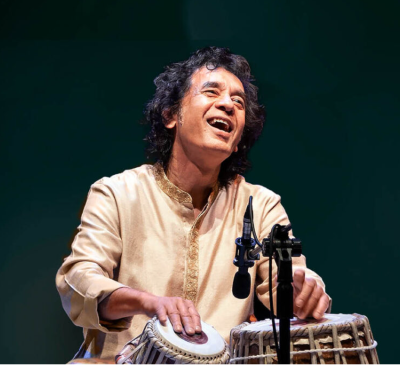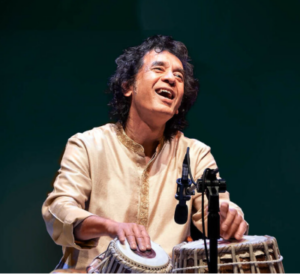“Zakir Hussain: A Tribute to the Legendary Tabla Maestro”

Introduction: Zakir Hussain, one of the most celebrated tabla virtuosos in the world, was a name synonymous with rhythm, tradition, and innovation. His mastery over the tabla, an Indian percussion instrument, brought him international recognition, and his contributions to Indian classical music and fusion genres have left an indelible mark on the music world.
Early Life and Beginnings: Born on March 9, 1951, in Mumbai, India, Zakir Hussain belonged to a family deeply rooted in musical tradition. His father, Ustad Allah Rakha, was a renowned tabla maestro, and it was under his tutelage that Zakir first learned to play the tabla. From an early age, Zakir displayed exceptional talent and a deep understanding of rhythm. By the age of 12, he had already begun performing professionally.
Rising to Fame: Zakir’s breakthrough came when he began collaborating with some of the most respected classical musicians in India, including sitar maestro Ravi Shankar. His musicality, combined with his unique ability to blend traditional rhythms with innovative styles, quickly made him a sought-after performer both in India and internationally.
Zakir Hussain’s collaborations extended beyond Indian classical music. He played with Western musicians, contributing to fusion projects that blended traditional Indian rhythms with jazz, rock, and other genres. One of his most notable collaborations was with the legendary violinist L. Subramaniam and the famous jazz guitarist John McLaughlin in the groundbreaking group Shakti, which sought to combine the worlds of jazz and Indian classical music.
His performances across the world, often as part of international tours, drew widespread acclaim for his virtuosity and ability to bridge cultural boundaries through music.
Innovative Contributions: Zakir was not only known for his remarkable technical skills but also for his contributions to tabla playing techniques. He introduced new patterns and rhythms, expanding the possibilities of the tabla. His performances were marked by a unique blend of intensity, precision, and subtlety, making him a true innovator in the world of percussion.
He was instrumental in popularizing the tabla globally, making it an integral part of fusion music while preserving its classical roots. Zakir’s vast discography includes both solo albums and collaborative works, showcasing the versatility of the tabla.
Awards and Recognition: Zakir Hussain’s contributions to music have been recognized with numerous prestigious awards. He was honored with the Padma Shri in 1988, the Padma Bhushan in 2002, and the Padma Vibhushan in 2019 by the Government of India for his exceptional achievements in the field of music. He also received several global accolades, including Grammy Awards, further solidifying his place as one of the greatest percussionists of his time.
The Legacy: Throughout his career, Zakir Hussain became not just a master of his craft, but also an educator and mentor. He founded institutions to promote the teaching and preservation of tabla music and passed on his knowledge to a new generation of musicians. His commitment to preserving the classical traditions while embracing modern influences made him a bridge between the past and the present in the world of Indian classical music.
Demise: Sadly, the world lost this legendary maestro on December 15, 2024. His passing marked the end of an era for tabla music. Zakir Hussain’s death was met with an outpouring of grief from the global music community. Tributes poured in from musicians, fans, and institutions worldwide, all acknowledging his immense contribution to the world of music.
Though Zakir Hussain is no longer with us, his music continues to inspire musicians and listeners alike. His legacy lives on in his recordings, his students, and in the hearts of those who were touched by his music. Through his fusion of tradition and innovation, Zakir Hussain has ensured that the tabla will remain a vital and dynamic force in music for generations to come.
Conclusion: Zakir Hussain’s remarkable career and life are a testament to the power of music to transcend boundaries and connect cultures. His artistry, skill, and vision have redefined the role of the tabla in both Indian classical and global music. While his physical presence may be gone, his legacy will continue to resonate through the beats of the tabla, forever echoing in the hearts of those who were fortunate to experience his brilliance.








